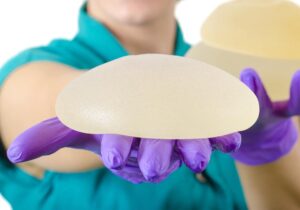
A possible association between breast implants and anaplastic large cell lymphoma (ALCL). Since 2011, when the U.S. Food and Drug Association (FDA) identified a possible association between breast implants and anaplastic large cell lymphoma (ALCL), a rare type of non-Hodgkin’s lymphoma, the agency has worked to better understand the condition. The FDA recently announced that […]

A possible association between breast implants and anaplastic large cell lymphoma (ALCL). Since 2011, when the U.S. Food and Drug Association (FDA) identified a possible association between breast implants and anaplastic large cell lymphoma (ALCL), a rare type of non-Hodgkin’s lymphoma, the agency has worked to better understand the condition.
The FDA recently announced that it agrees with the World Health Organization’s conclusion that the rare T-cell lymphoma “can develop following breast implants.”
In 2011, there were so few known cases of breast-implant associated ALCL that the FDA said it was not possible to determine what factors increased a woman’s risk. The agency issued a report that emphasized the need to gather additional information “to better characterize ALCL in women with breast implants.”
The device-injury attorneys at Parker Waichman note, in addition to this rare cancer, women can experience complications with breast implants including rupture or deflation of the implant, and capsular contracture, the hardening of the breast area around the implant.
On March 23, 2017, the FDA reported that breast-implant associated ALCL has been associated with nine deaths. As of February 1, the FDA had received 359 reports of ALCL associated with the implants. Anaplastic large-cell lymphoma is an immune-system malignancy. In cases linked to implants, the cancer grows in the breast, usually in the capsule of scar tissue that forms around an implant. This cancer is usually treatable and not often fatal, the New York Times reports. In many cases, the disease is eliminated when the implant and surrounding tissue are removed, though some women need chemotherapy and radiation, according to the Times.
Since 2011, the FDA has “strengthened” its understanding of this condition. The exact number of cases, however, remains difficult to determine because of the lack of data on global implant sales and limited worldwide reporting on the condition. But available data indicates that the condition occurs more frequently with breast implants with textured surfaces.
Of the 359 reported cases of the cancer, 231 included information about the implant surface: 203 were textured implants, and 28 were smooth. According to the Times, the contents of the implants appeared much less important than the implant’s texture. In the 312 cases where the implant’s contents were known, 186 were filled with silicone gel, and 126 with saline.
Research examining the risk factors for BIA-ALCL suggests that the methods used to create the surface texture of the implant and the role of biofilm in causing disease may be among the factors.
Health regulators outside the United States have also noted the ALCL risk. The Australian Therapeutic Goods Administration (TGA) reported a detailed analysis of 46 confirmed cases of ALCL in Australia, including three deaths. TGA estimated the risk of developing breast-implant associated ALCL to be between 1-in-1000 and 1-in-10, 000 women with breast implants. The French National Agency for Medicines and Health Products Safety (ANSM) asked manufacturers of textured breast implants to perform biocompatibility testing to determine how living tissues react to textured implants.
Doctors do not know why the breast implant surface makes a difference in ALCL risk, but the body reacts differently to textured implants than to smooth ones, according to Dr. Alex K. Wong, a plastic surgeon and researcher at the University of Southern California’s Keck School of Medicine. Tissue grows into microscopic grooves in the textured implants, Dr. Wong said.
The FDA plans to continue collecting reviewing medical device reports on breast implants. The agency will also review medical literature on this issue and will exchange information with international health regulators and scientific experts. Further, the FDA will review the information implant manufacturers provide to the medical community and patients.
The American Society of Plastic Surgeons said that in 2016 about 290,000 women had implants for breast enlargement, and 109,000 received implants in reconstructive surgery after breast cancer. The FDA advises patients to learn as much as they can about different types of breast implants before agreeing to implant surgery. Patients can consult the Breast Implants pages of the FDA website for information about implants. Before getting breast implants, the FDA advises women to discuss the benefits and risks of textured-surface vs. smooth-surface implants with their doctors.
The FDA says it is important for women with breast implants to have routine mammography screening done by a technologist specifically trained in performing.
The personal injury attorneys at Parker Waichman LLP offer free, no-obligation case evaluations. For more information, fill out our online contact form or call 1-800-YOURLAWYER (1-800-968-7529).


